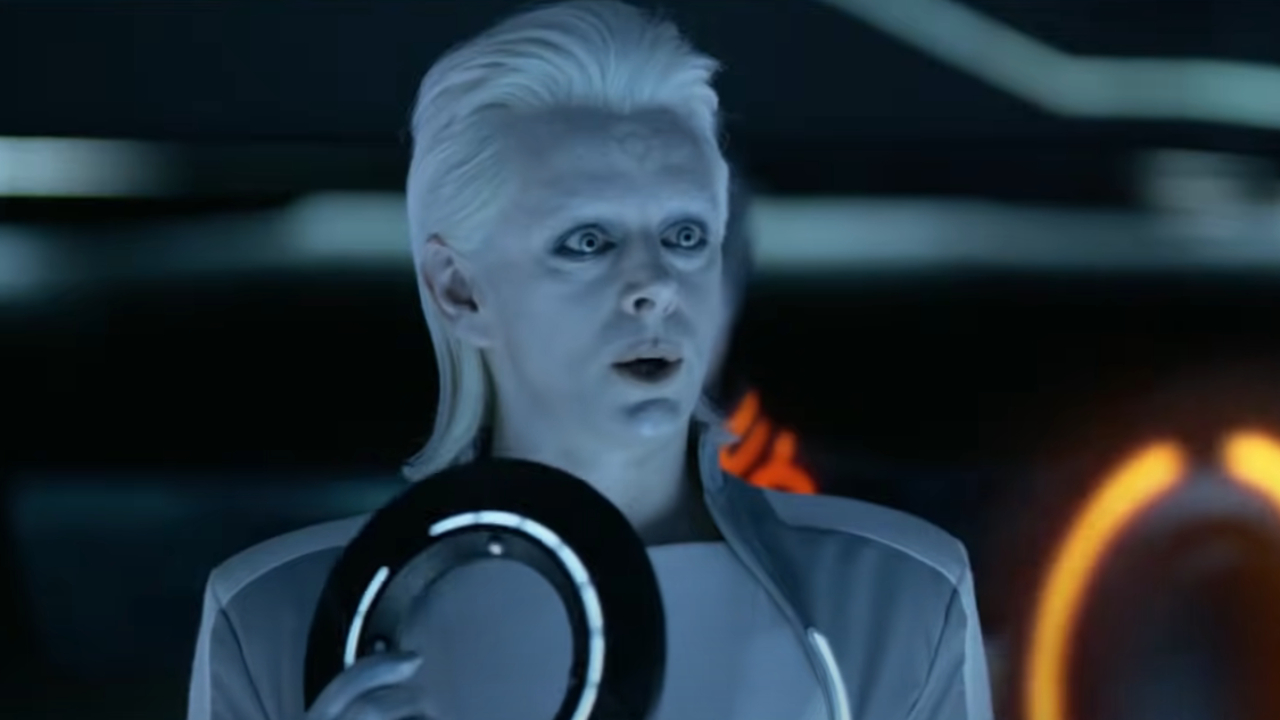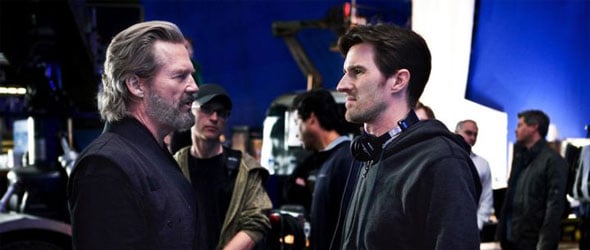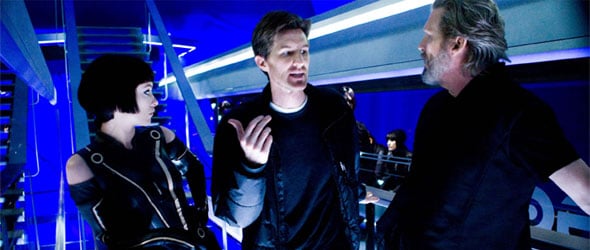Exclusive Interview: Tron Legacy Director Joseph Kosinski

Your Daily Blend of Entertainment News
You are now subscribed
Your newsletter sign-up was successful
When most directors start working on their first feature film, it’s typically something on a smaller scale that’s easy to get their head around. So what was director Joseph Kosinski selected to make as his first feature? Just a sequel nearly 30 years in the making with a $200 million budget that took three years to complete: Tron: Legacy. Not exactly what you would call typical.
Last month I was given the opportunity to sit down with the director one-on-one merely 24 hours after the film’s world premiere and only two days after its completion. During our discussion we talked about his influence as an architect as it related to the character of Kevin Flynn, the religious parables that can be made in the in the film and using 3D in the style of The Wizard of Oz. Check out my interview with Tron: Legacy director Joseph Kosinski below.
During the Tron Night screening that I went to back in October, Steven Lisberger, the director and creator of the first Tron movie, said that the reason it took thirty years for a sequel to get made was because the young people who were inspired by the film needed to grow up and direct it themselves. Do you think that this a fitting description of yourself?
Yeah, I saw the movie when I was seven or eight years old on VHS, and I remember it was a completely unique vision, like nothing else out there. I’m a kid who grew up in the digital age, I had the Mac Classic in the 80s, I was lucky enough to go to school when everyone had laptops, and went to architecture school where they gave us all those digital programs. I consider myself a digital kid. And I think you needed someone who grew up in the digital age to then take this film on and reinvent it or evolve it so that it worked for this generation. I think that Steve was 10-15 years ahead of his time with that movie. I had a great time working on it for sure.
You mentioned that you went to school as an architect, and one of main characters in this film, Kevin Flynn, builds the world within the computer. Do you find yourself relating to that character?
I think I did. That was a big reason why I was so interested is the designer in me. I saw an opportunity to create and entire universe from scratch and it’s rare to find an opportunity to say it’s all created by one mind. Because most science fiction films, every building looks different, vehicles kind of coddle together, and there’s something kind of cool about that messiness. For this it was like, “Wow, this is all from the mind of one man, so I can build the architecture, the costumes, the vehicles, everything can feel cohesive and fits together, in a way that you could never do on another movie.” For me, the design side of me was like, “Wow, I get to build a universe” and that was exciting. The art department I assembled for this movie, my production designer and the artists I pulled from all these disciplines to work on it, it was a real dream come true. I was so happy with the art department and the artwork on this movie.
On the other side of that, on the creation side, there seems to be a religious parable that can be made. You have Flynn, who’s the creator who makes someone in his own image; in a way you could say that Clu is a Satan-type character who rebels against his creator and tries to start a war. Was that something that you were conscious of during production on the film?
Your Daily Blend of Entertainment News
There’s certainly some strong religious references in the first film, the idea of users and programs, so I think that’s just inherent in the property. But I think there are certain storylines that are just kind of mythic that we as humans are drawn to. This is a mythic story. The hero’s journey goes back to Homer. So there’s something just very kind of mythic in that DNA of this world that just somehow resonates and seemed like the right through line for us to kind of find a way in to this world.

In terms of relating to the first film, at a very basic level they have a similar storyline, but one aspect that really sets Tron: Legacy apart is the relationship between Sam and Kevin Flynn. When it came to the story as a whole, where did that aspect rank as a priority?
The father-son relationship was always the main priority of this film, from the very beginning. I think the reason that Sean [Bailey] and I got Disney to make the movie in the first place is, yes, we’re going to blow them away visually, we’re going to push the envelope technically, but at the core this is a father-son story and that’s why this is a Disney movie – because that’s the emotional core. So that was priority from day one and was always the focus beyond everything else and when we had the opportunity we always knew we had a week of reshoots after we had a chance to look at the film and reevaluate. That was the storyline that we wanted to polish and make sure was as tight as possible.
Which scenes came as a result of the reshoots?
We shot for a couple of days. It only amounts to a couple minutes over the course of the two-hour movie, it’s little things. It’s not stuff you would actually guess. It’s a little of the bedtime story at the beginning, the Clu/Tron figurines, because it was important to establish… I wanted to make sure we establish those characters right off the bat, so those little figurine inserts. It was actually that ENCOM boardroom scene just to give a little more context to what Sam was doing breaking into ENCOM. A couple of lines and short scenes throughout the film, but it’s just tiny, tiny little adjustments that, as a whole, hopefully take the movie up one more notch.
In terms of the visuals one of the things I loved was how you went against the idea that 3D is a gimmick by only using it in the scenes in the computer world, using it as a filmmaker’s tool and a way to improve the visual storytelling. Was that always the plan?
I think that Wizard of Oz, for me, using it as a dramatic device, like The Wizard of Oz used color, to me seemed like a real smart way to also make the moment of Sam in the grid have that much more resonance to it. And if you see the movie in IMAX we actually go to a larger format image at that point too, to even take it to the next level. So I never wanted it to be a gimmick, I wanted to treat the screen like a window into another world and I’m glad you felt that way because that was the intention.

What was it like working with the IMAX cameras?
Well, we shot with the new F-35 Sony Cam, which is the latest generation of Sony camera which is a generation newer than what [James] Cameron used on Avatar. But we used the James Cameron Pace camera rig. So we used the best technology available and when you see it on the giant IMAX screen I’m really excited by that. It’s a different experience than watching on… I love the format we looked at last night, but there’s something nice for people who want that kind of all-encompassing, big image, IMAX is a cool format.
You said last night (11/18/10) that you only finished the film the day before. This movie has been so many years in the making, when you made that final touch, what was your first reaction? What did you do, what did you say?
I just don’t think I had time to comprehend it because we literally worked up until the last minute and it’s hard – it’s one of those things that I could always go back, I could always watch it and go, “I wish I could fix that and move that and trim that.” But now I think in a couple days I’ll eventually let go and let it play. It’s part of the process. It’s like giving birth to a child – you have to let it go off and do its own thing and you realize it’s the worlds, it’s not mine anymore. So it will be interesting, this is the first time through this whole process.
On that note, this is your first feature film and it’s absolutely gigantic. How does that feel?
It’s been an organic process. I was excited when I first got it, but it’s kind of grown. It’s been a three year thing so it’s grown bigger as I’ve worked on it. It’s great knowing that there’s excitement out there for it, it’s a good thing, and it’s also, to me, a little worrisome because of expectations, the level of hype that films get now it’s a little mind-boggling and crazy. It’s like you can never live up to the expectation or the hype that sometimes these things generate. You hope that people go in open-minded, hopefully seeing as little as possible of the marketing, so that they still get surprised. Because I like to go to the theater and be surprised and I’ve been very cognizant of making sure we try and hold as much back as possible. I’m curious to hear from your point of view if you feel like you knew too much going into this movie or if you feel like there’s enough in there to kind of surprise you along the way.
Have you started to think about your next project yet or do you plan on taking a break? Your name has been mentioned in association with a few projects already from the remake of The Black Hole, to Oblivion and Archangels.
I don’t know. I’ve got a couple things in development, a couple things being written. Right now the next month is me just getting out there and publicizing this movie and opening it in December. And then two weeks off and we’ll see when I get back in January what’s up next.
Do you have any preference as to which one you’d want to do first?
I don’t know yet. All of these scripts we’re working on are kind of coming to a head right now so, hopefully, Christmas break, take some time off, read where were at and hopefully pick the next one. It’s very exciting.

Eric Eisenberg is the Assistant Managing Editor at CinemaBlend. After graduating Boston University and earning a bachelor’s degree in journalism, he took a part-time job as a staff writer for CinemaBlend, and after six months was offered the opportunity to move to Los Angeles and take on a newly created West Coast Editor position. Over a decade later, he's continuing to advance his interests and expertise. In addition to conducting filmmaker interviews and contributing to the news and feature content of the site, Eric also oversees the Movie Reviews section, writes the the weekend box office report (published Sundays), and is the site's resident Stephen King expert. He has two King-related columns.
